Tenía pendiente compartir aquí en mi blog una receta de algún pan de Navidad o Año Nuevo, como prometí en una publicación anterior, así que les traigo uno tradicional de Grecia, tierra de origen de mis padres, y su nombre es Jristópsomo (Χριστόψωμο), que traducido sería Pan de Cristo.
I had pending to share here on my blog a recipe for some Christmas or New Year bread, as promised in a previous post, so I bring you a traditional one from Greece, land of origin of my parents, and its name is Hristopsomo (Χριστόψωμο), which translated would be Bread of Christ.
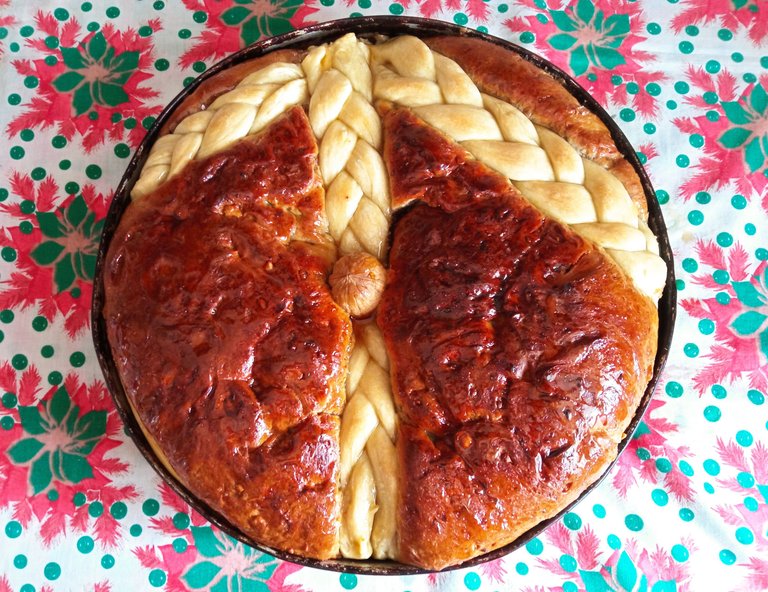
Desde tiempos antiguos, el trigo ha sido el alimento más importante para los griegos, y por lo tanto también el pan, y los panes fortificados, con harinas finas y especies, miel, frutos secos, etc., era algo que se le ofrecía a los dioses. Antes del cristianismo, esta fecha que coincide con el solsticio de invierno en el hemisferio norte, era motivo de grandes celebraciones, significaba la activación de todo el ciclo de la vida, el trabajo en el campo y la cosecha. Muchas civilizaciones festejaban este ciclo, los egipcios, romanos, griegos, persas, los aztecas, entre otros.
Since ancient times, wheat has been the most important food for the Greeks, and therefore also bread, and fortified breads, with fine flours and spices, honey, dried fruits, etc., was something offered to the gods. Before Christianity, this date, which coincides with the winter solstice in the northern hemisphere, was a reason for great celebrations, signifying the activation of the whole cycle of life, work in the fields and the harvest. Many civilizations celebrated this cycle, the Egyptians, Romans, Greeks, Persians, Aztecs, among others.
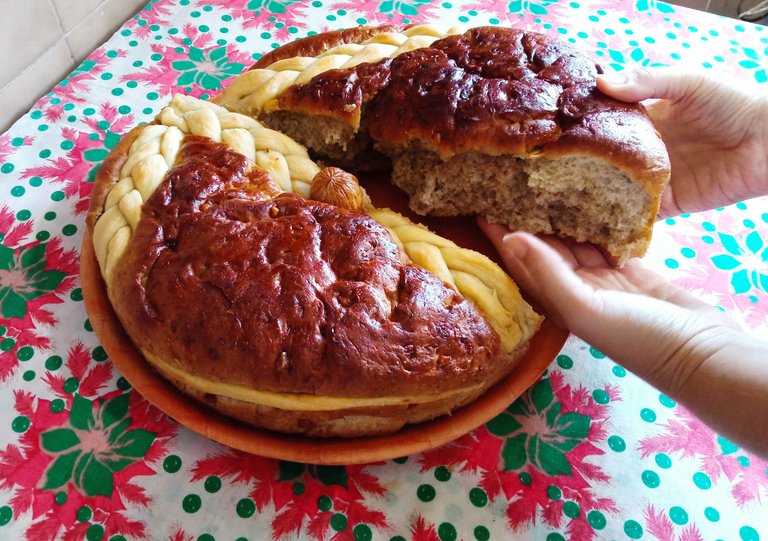
Algunas tradiciones se mantuvieron a lo largo de los años y se mezclaron con otras cuando se adoptó el cristianismo. Aunque al parecer no hay información concreta de cómo se originó exactamente el Jristópsomo (Jristós = Cristo / Psomí = Pan), se prepara en toda Grecia en Navidad y cada región del país le pone algo diferente a la receta. En mi casa siempre se ha hecho el Tsuréki, otro pan festivo, es la primera vez que preparo este, y entre varias recetas que vi, elegí la de un famoso chef griego, Akis Petretzikis.
Some traditions were maintained over the years and mixed with others when Christianity was adopted. Although there seems to be no concrete information on exactly how the Hristopsomo (Hristos = Christ / Psomi = Bread) originated, it is prepared all over Greece at Christmas and each region of the country puts something different to the recipe. In my house they have always made Tsuréki, another festive bread, this is the first time I prepare this one, and among several recipes I saw, I chose the one from a famous Greek chef, Akis Petretzikis.
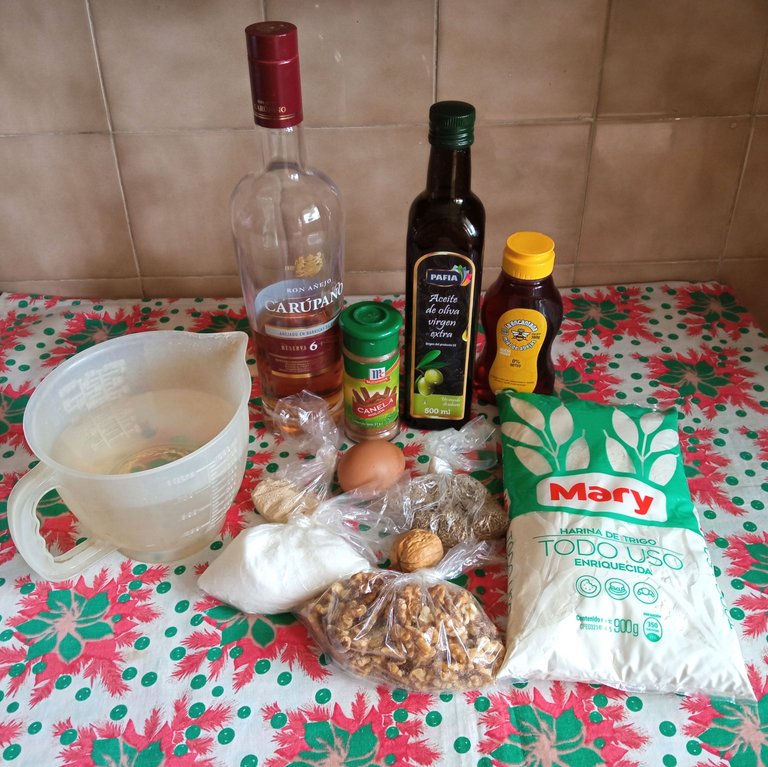
Ingredientes / Ingredients
Para el pan:
- 550-600 ml de agua a temperatura ambiente
- 18 gr de levadura
- 120 gr de azúcar
- 50 ml de aceite de oliva
- 1 Kg de harina de trigo para todo uso
- 1 cucharadita de canela en polvo
- 10 gr de sal
- 30 gr de anís dulce
- 100 gr de nueces
Para la masa decorativa:
- 120 ml de agua tibia
- 20 ml de aceite de oliva
- ½ cucharadita de sal
- 250 gr de harina de trigo para todo uso
- 1 nuez con la cáscara
- 1 huevo
Para el sirope:
- 120 ml de miel
- 20 ml de Cognac o Ron
For the bread:
- 550-600 ml water at room temperature
- 18 grams of yeast
- 120 grams of sugar
- 50 ml of olive oil
- 1 kg of all-purpose wheat flour
- 1 teaspoon of cinnamon powder
- 10 grams of salt
- 30 grams of sweet aniseed
- 100 gr of walnuts
For the decorative dough:
- 120 ml of warm water
- 20 ml of olive oil
- ½ teaspoon salt
- 250 gr all-purpose wheat flour
- 1 walnut in shell
- 1 egg
For the syrup:
- 120 ml honey
- 20 ml of Cognac or Rum
Antes de comenzar a preparar la masa, procedemos a romper un poco las nueces, para eso las colocamos en una bolsita plástica y con la parte plana de un martillo de cocina, vamos aplastándolas para que nos queden en trozos pequeños.
Before starting to prepare the dough, we proceed to break the walnuts a little, for that we place them in a plastic bag and with the flat part of a kitchen hammer, we crush them so that they are in small pieces.
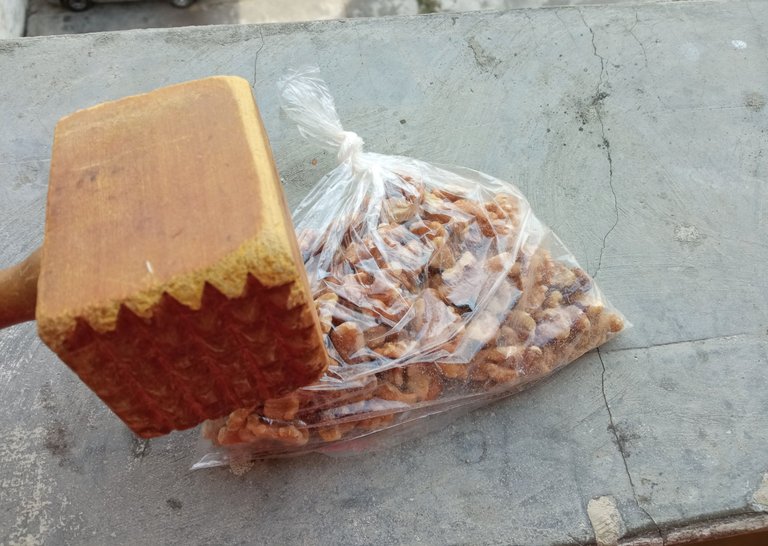
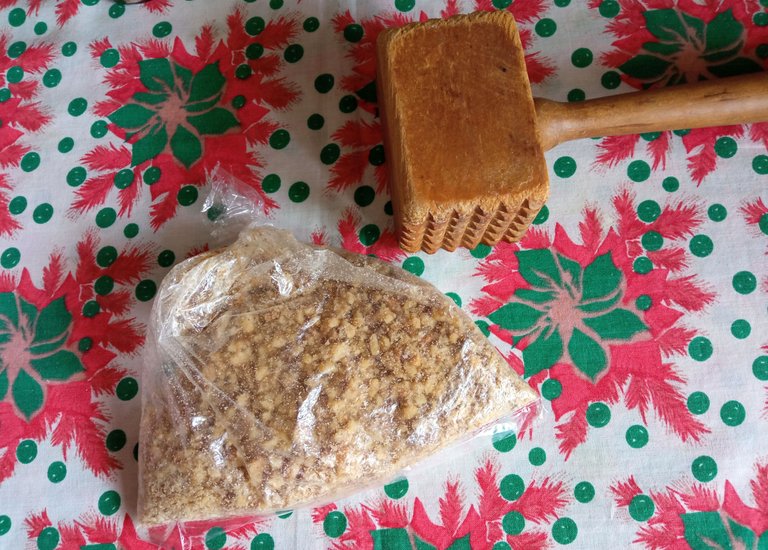
Preparación / Preparation
Ponemos el agua, la levadura y el azúcar en un bol y revolvemos bien con un batidor manual hasta que la levadura se disuelva.
Put the water, yeast and sugar in a bowl and stir well with a whisk until the yeast is dissolved.
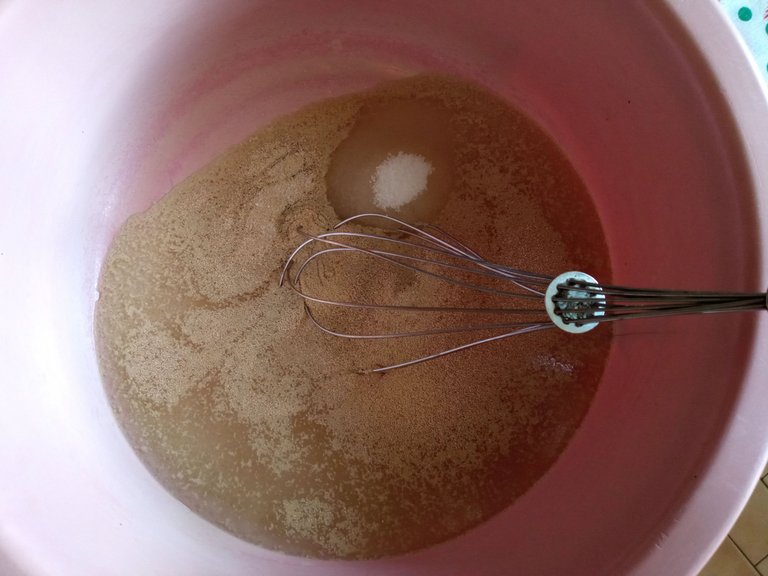
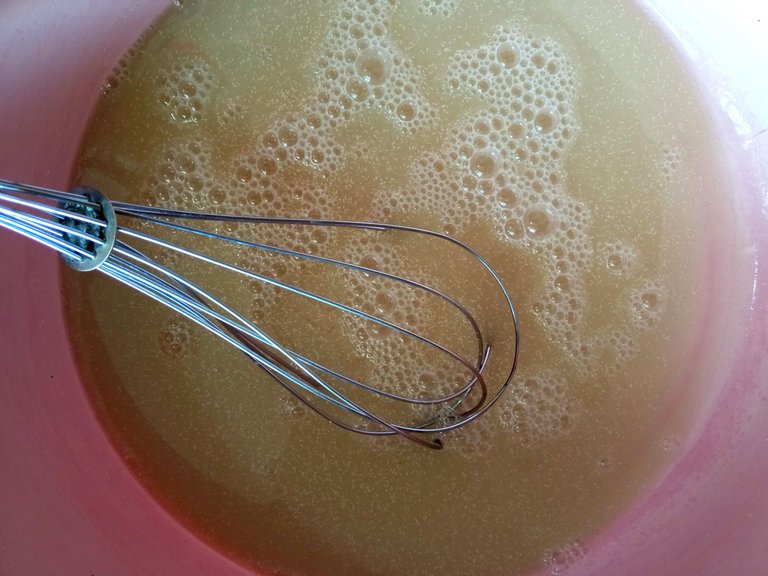
Añadimos el aceite de oliva, la harina, la canela y mezclamos hasta que nos quede una masa homogénea.
Add the olive oil, flour, cinnamon and mix until you have a homogeneous dough.
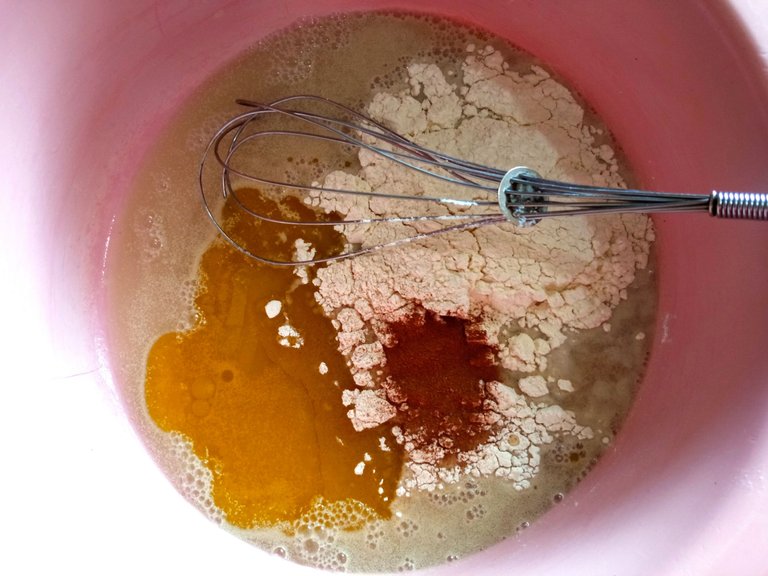
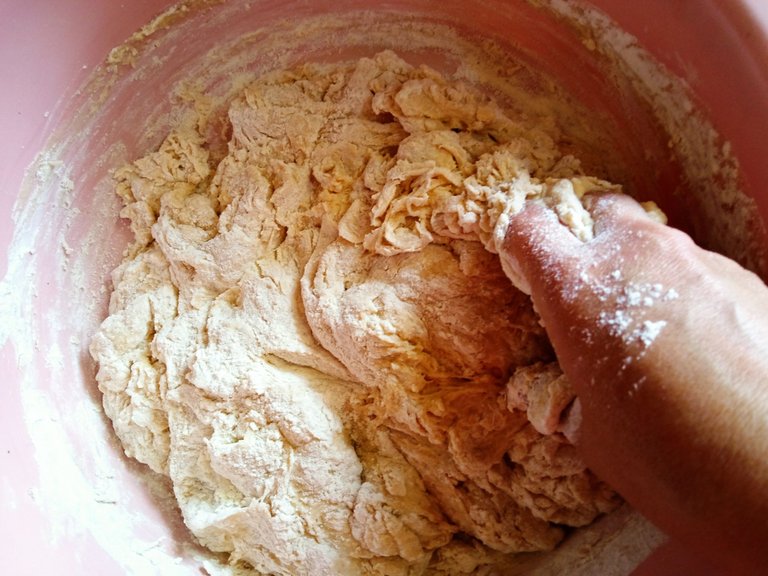
Luego agregamos la sal, el anís dulce y las nueces y amasamos hasta que todo se incorpore bien a la masa. Si está muy dura, le echamos más agua.
Then add the salt, sweet anise and walnuts and knead until everything is well incorporated into the dough. If it is too hard, add more water.
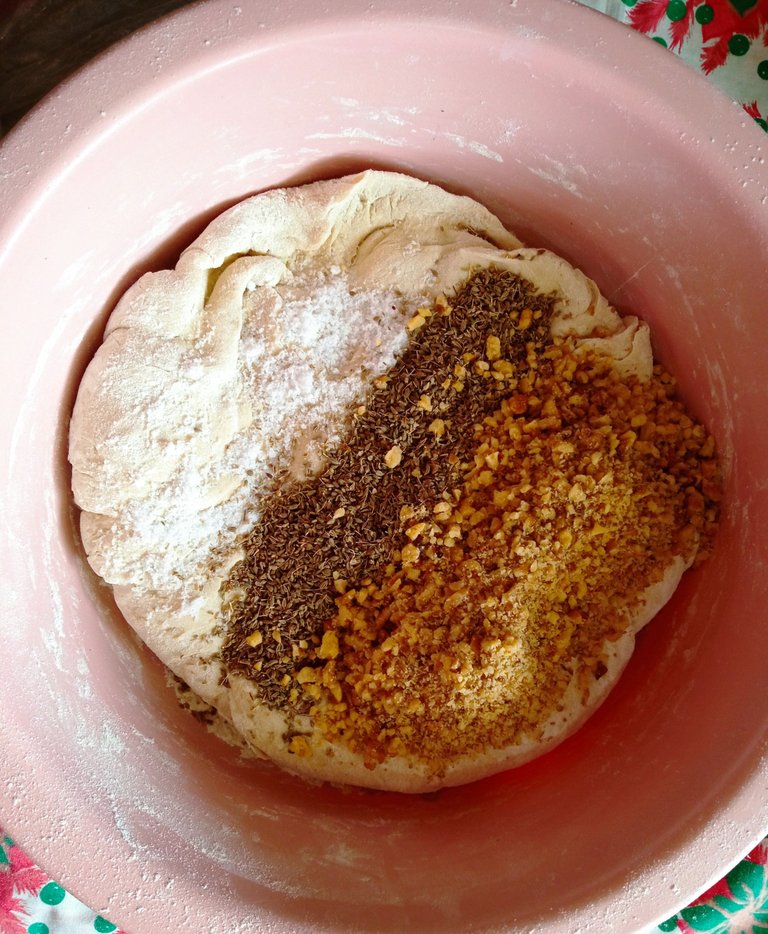
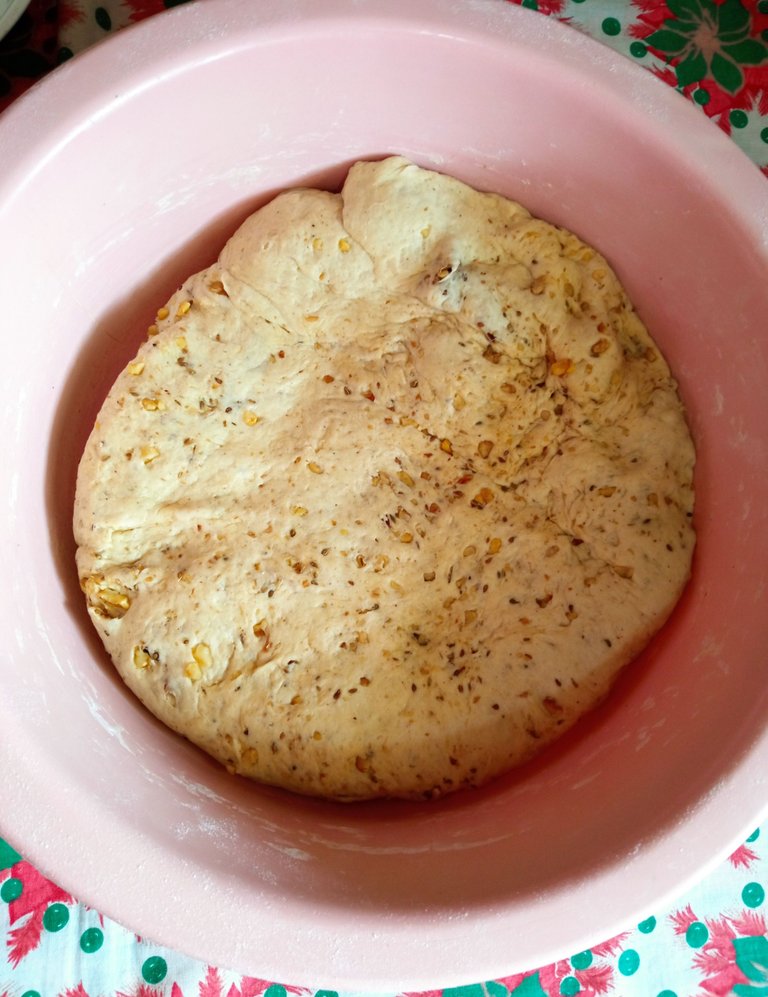
Untamos el bol con una cucharada de aceite de oliva y colocamos la masa allí, tapamos con una toalla o membrana plástica y dejamos reposar por una hora más o menos, hasta que duplique su tamaño.
Grease the bowl with a tablespoon of olive oil and place the dough in it, cover with a towel or plastic wrap and let it rest for about an hour, until it doubles in size.
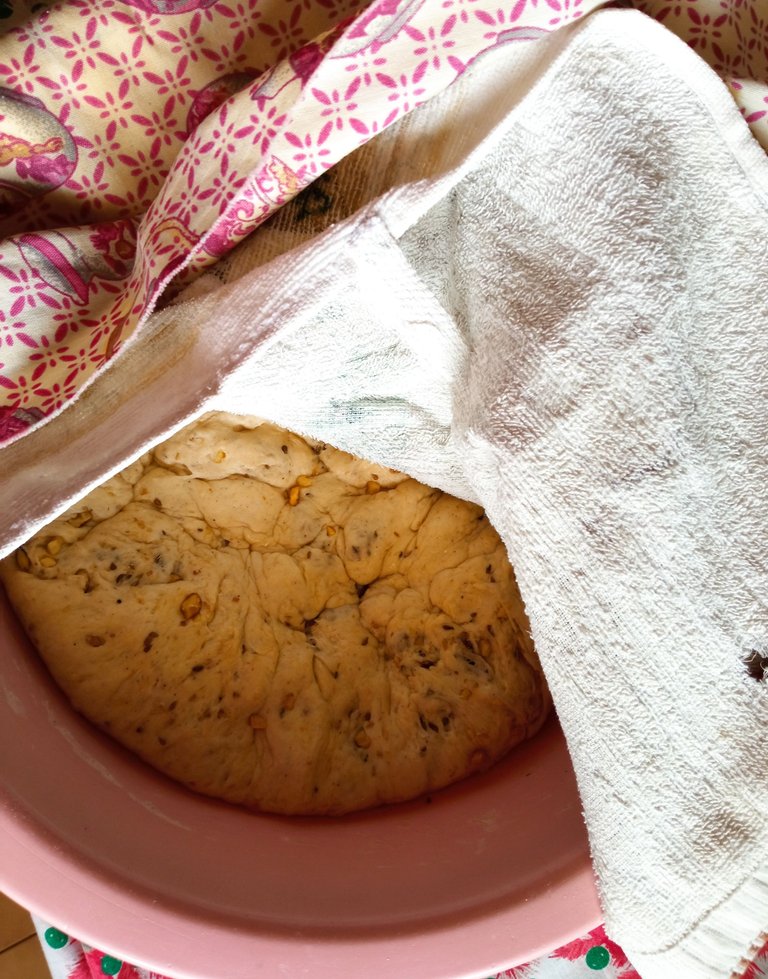
Vamos ahora con la preparación de la masa que usaremos para adornar el pan. Simplemente ponemos todos los ingredientes en un bol y mezclamos hasta obtener una masa lisa, luego la colocamos en una bolsa plástica a reposar.
Let's go now with the preparation of the dough that we will use to decorate the bread. We simply put all the ingredients in a bowl and mix until we obtain a smooth dough, then we place it in a plastic bag to rest.
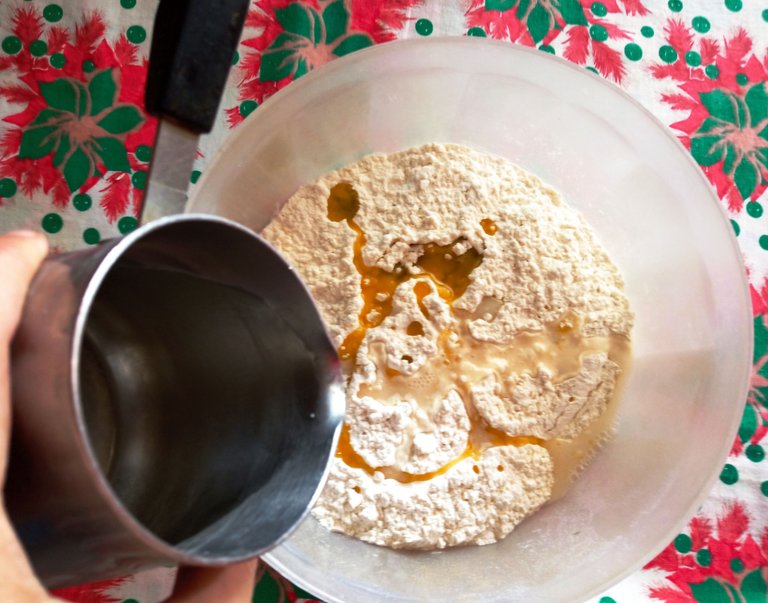
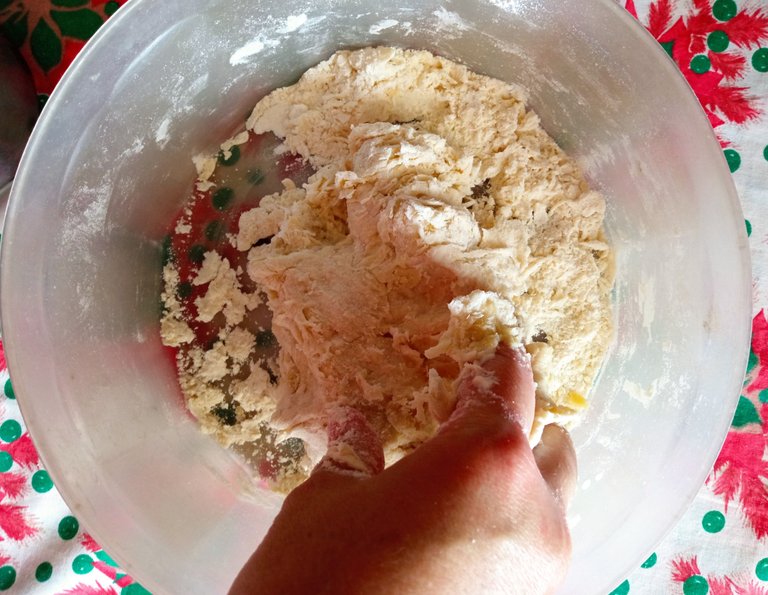
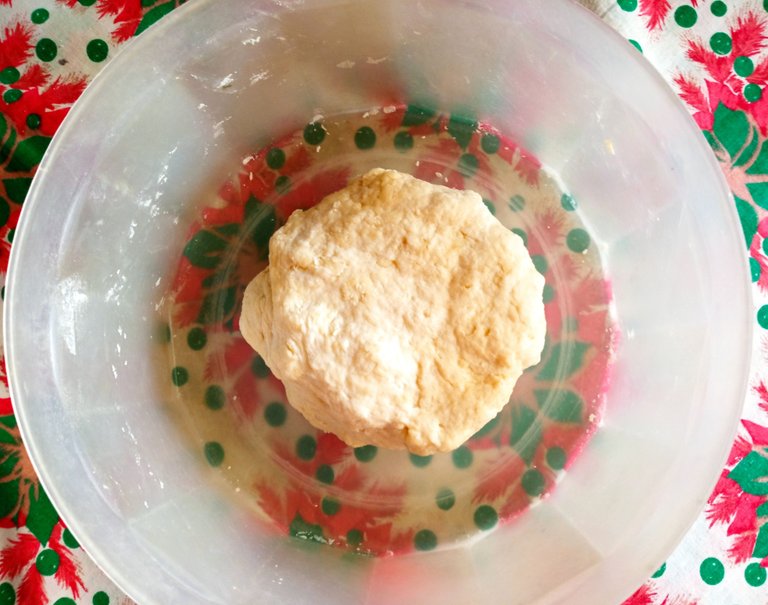
Al pasar la hora de reposo de la masa del pan, vamos a buscarlo para amasarlo suavemente, quitarle el aire y darle forma redonda. ¡Miren cómo creció!
After the bread dough has rested for an hour, let's get it to knead it gently, remove the air and give it a round shape. Look how it has grown!
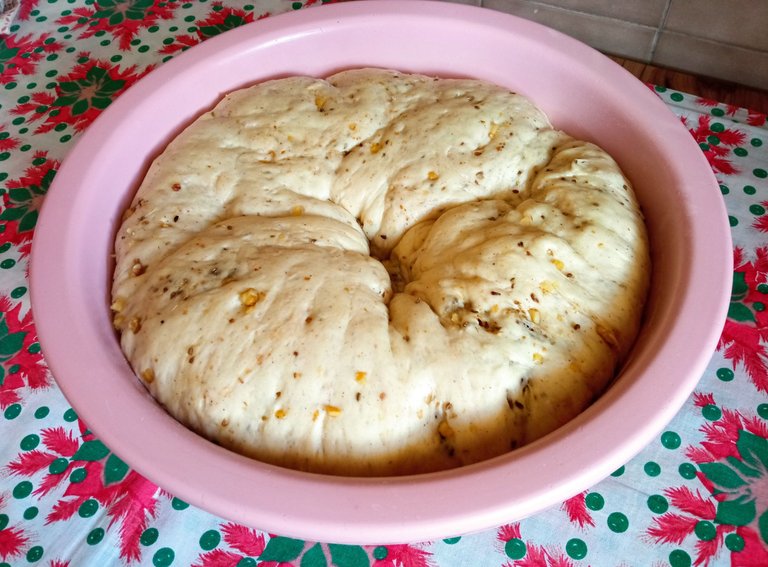
Engrasamos el molde y ponemos la masa allí sin aplastarla, dejando que se extienda sola.
Grease the mold and place the dough in it without flattening it, letting it spread by itself.
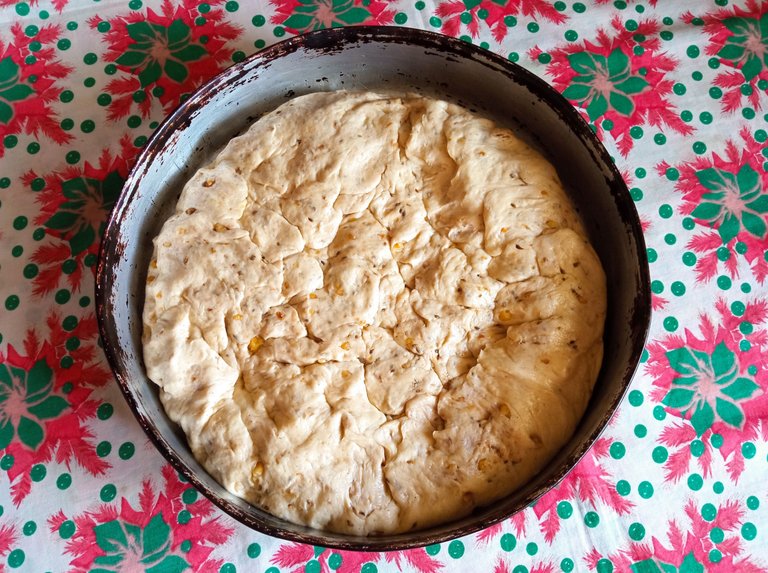
Buscamos la masa para decorar, la dividimos en dos partes y luego cada pedazo en tres partes, y con nuestras manos las extendemos sobre la mesa y formamos tiras para tejer trenzas.
We look for the dough to decorate, divide it into two parts and then each piece into three parts, and with our hands we spread them on the table and form strips to weave braids.
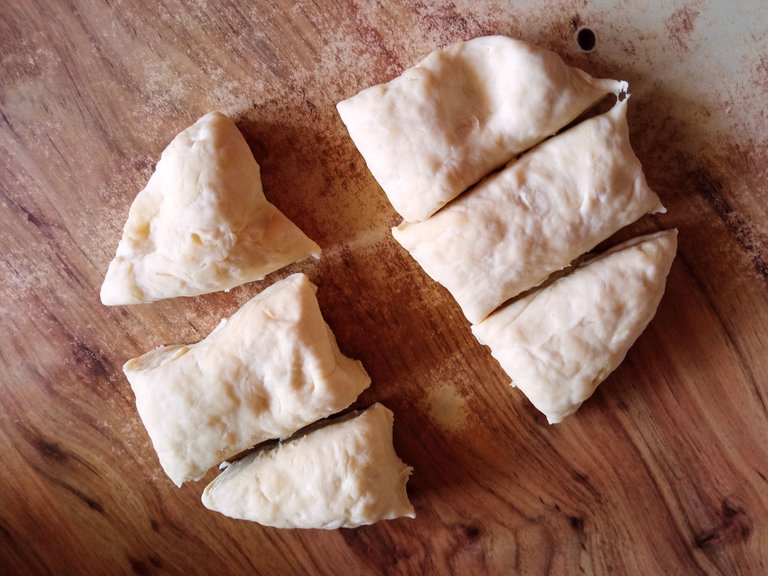
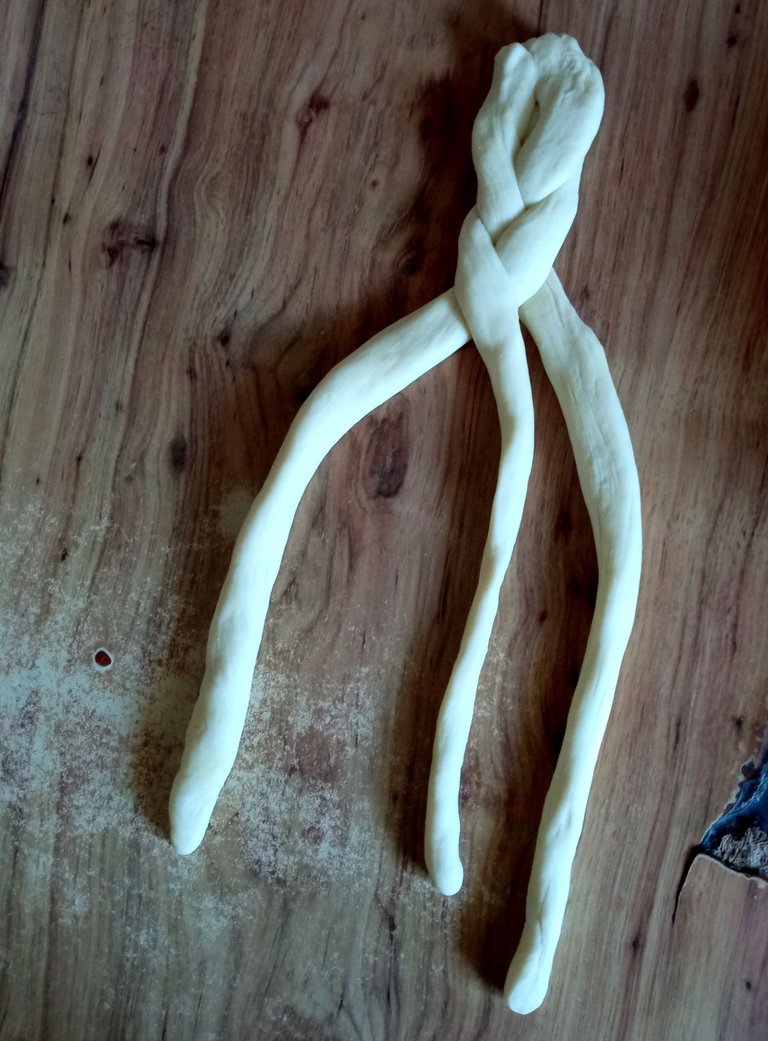
Batimos el huevo y con una brocha pintamos la superficie del pan, esto para que las trenzas decorativas se peguen. Se puede diseñar según la creatividad y luego colocamos la nuez con la cáscara donde queramos, yo la puse en el centro.
We beat the egg and with a brush we paint the surface of the bread, this so that the decorative braids stick. You can design it according to your creativity and then place the walnut with the shell where you want, I put it in the center.
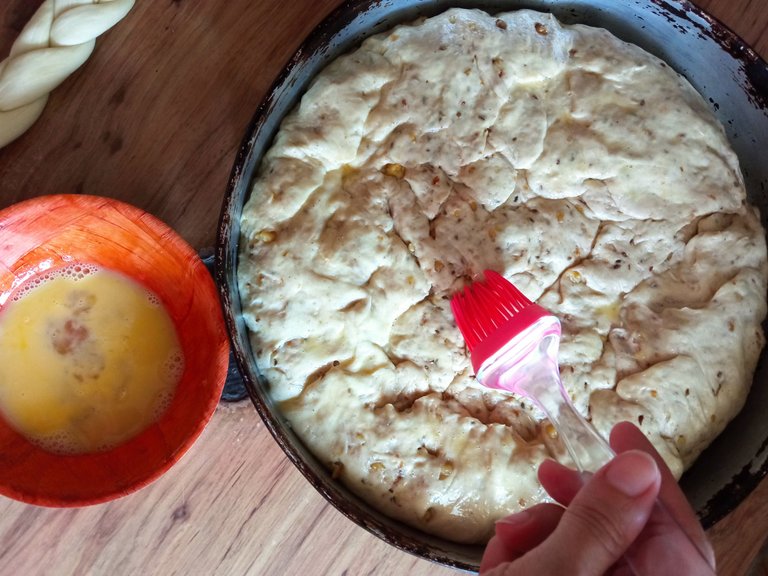
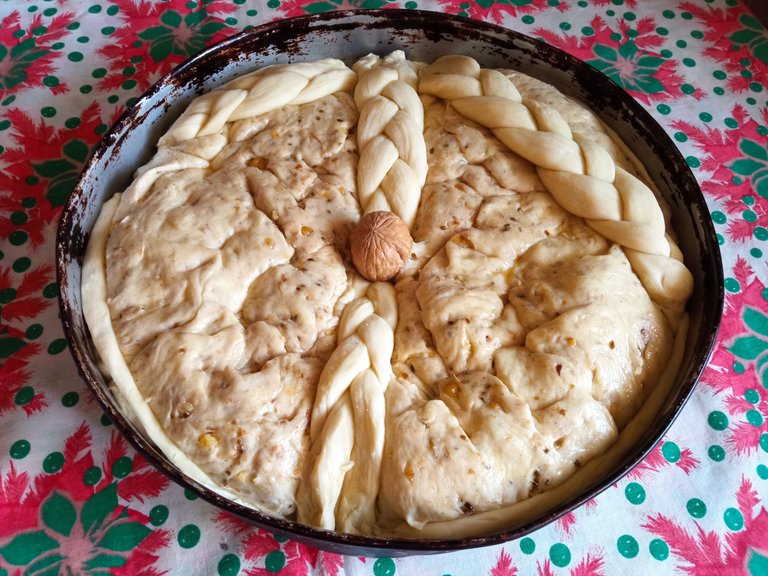
Tapamos con una toalla y dejamos que levante por segunda vez durante una hora. Y miren esto, ¡el molde le quedó pequeño!
Cover with a towel and let it rise a second time for an hour. And look at this, the mold turned out small!
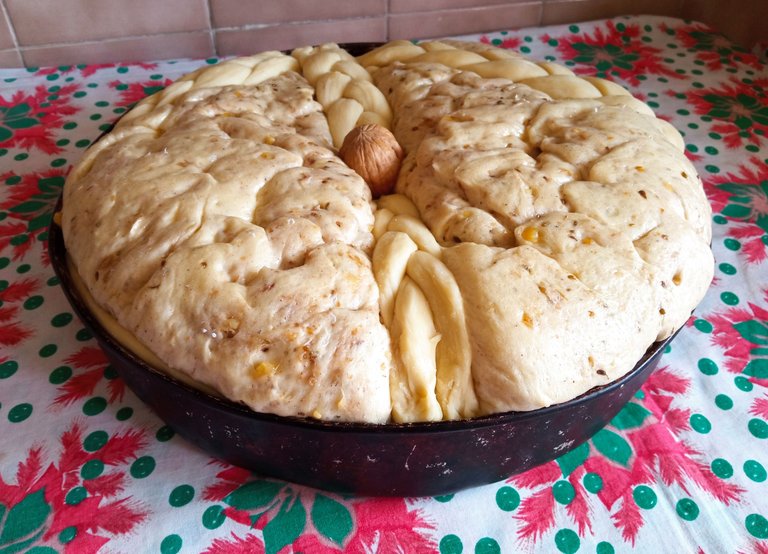
Precalentamos el horno a º180 y horneamos por aproximadamente una hora, hay que ir chequeando porque cada horno es diferente. Un poco antes de sacar el pan, preparamos el sirope, mezclando muy bien la miel con el Cognac, en mi caso usé Ron, que es un buen sustituto.
Preheat the oven to º180 and bake for about an hour, you have to keep checking because each oven is different. A little before taking out the bread, prepare the syrup, mixing the honey with the Cognac, in my case I used Rum, which is a good substitute.
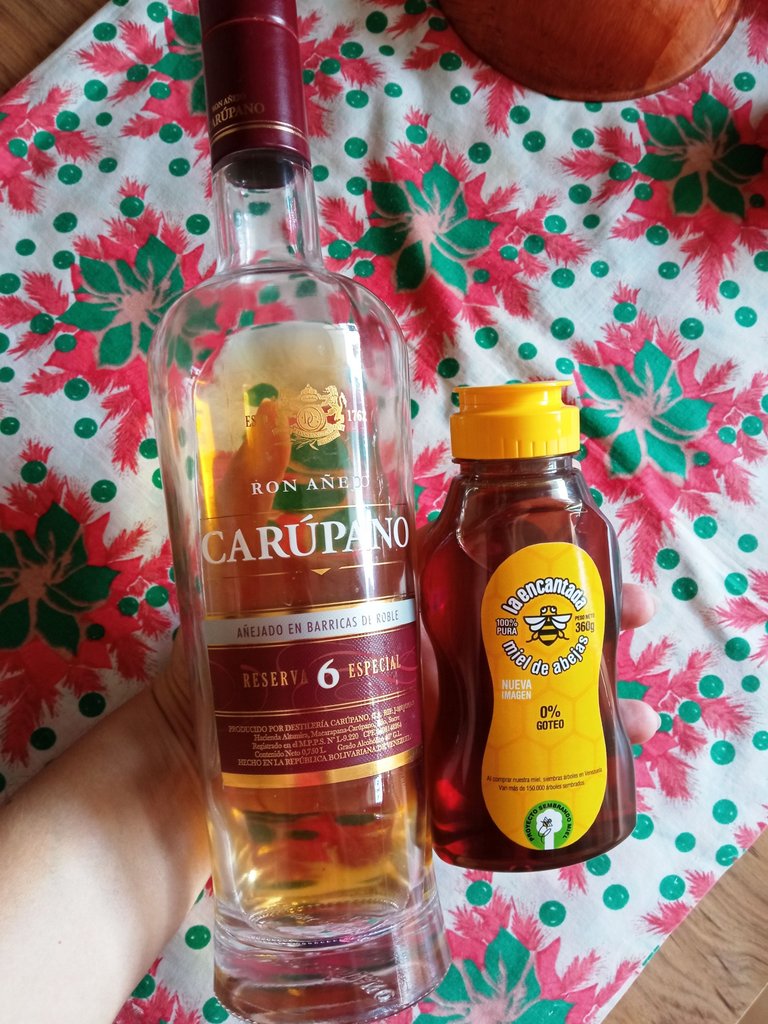
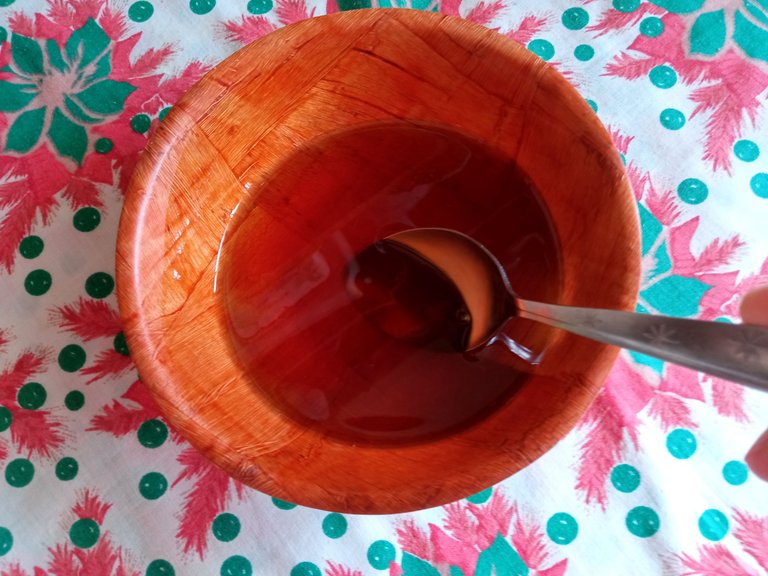
Al sacar el pan del horno, inmediatamente le echamos el sirope poco a poco con una cuchara, procurando cubrir bien toda la superficie.
When removing the bread from the oven, immediately pour the syrup little by little with a spoon, making sure to cover the entire surface well.
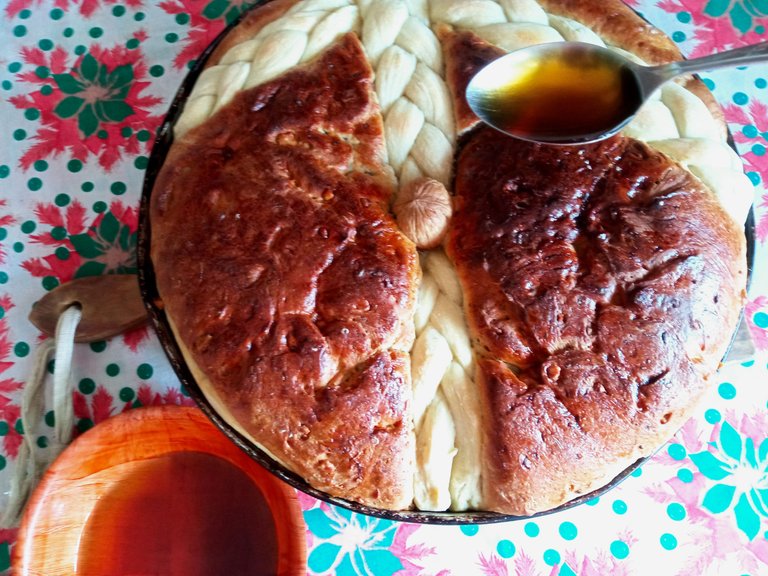
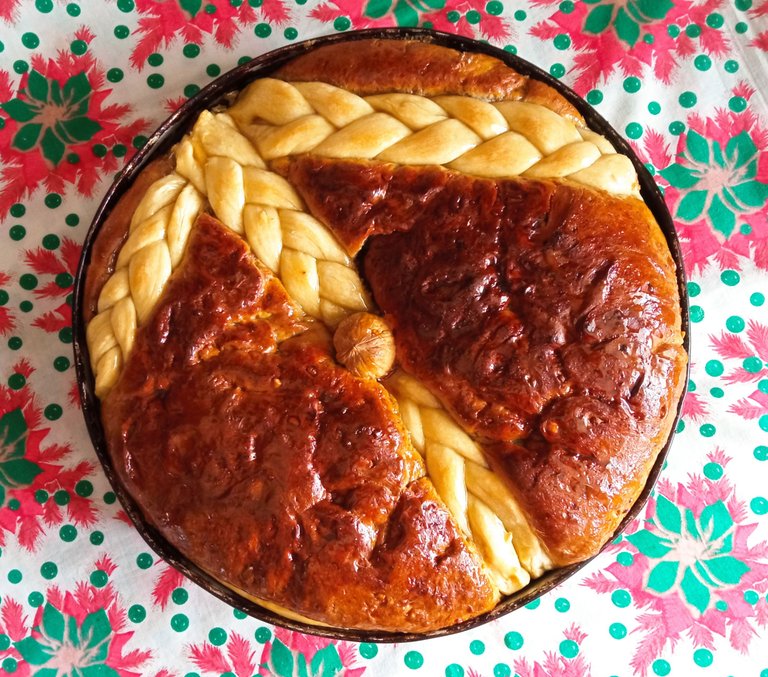
El Jristópsomo se suele preparar un par de días antes de Navidad, para que su sabor sea mejor al comerlo, y según la tradición no se debe cortar con un cuchillo porque el metal “hiere el pan”, debe hacerse con la mano.
The Hristopsomo is usually prepared a couple of days before Christmas, so its flavor is better when eaten, and according to tradition it should not be cut with a knife because the metal “hurts the bread”, it should be made by hand.
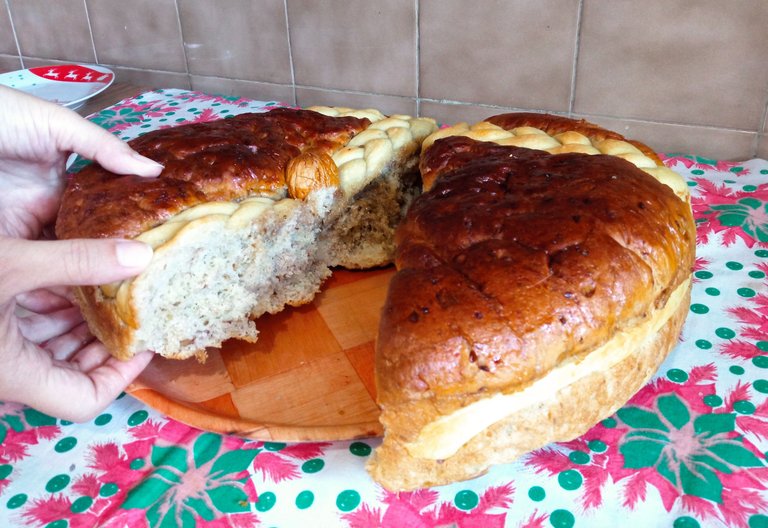
La textura de este pan es muy buena, una miga suave, y su aroma y sabor también me gustaron mucho.
The texture of this bread is very good, a soft crumb, and I liked its aroma and flavor very much too.
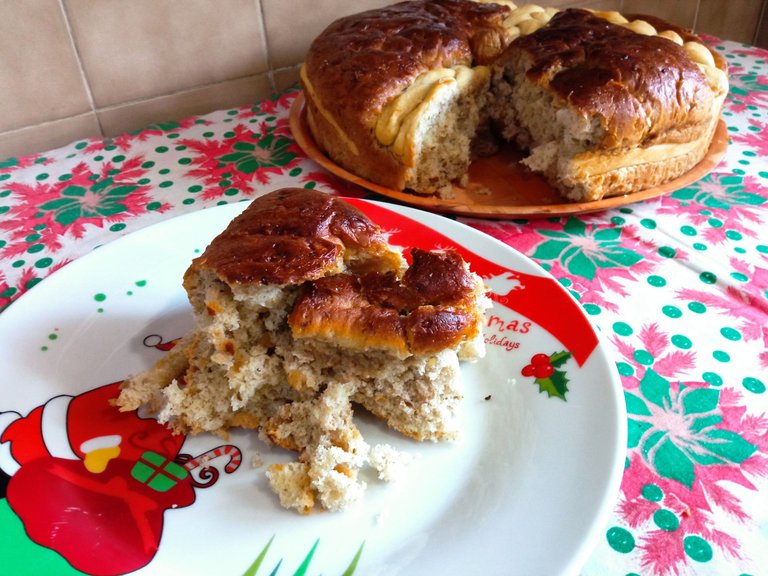
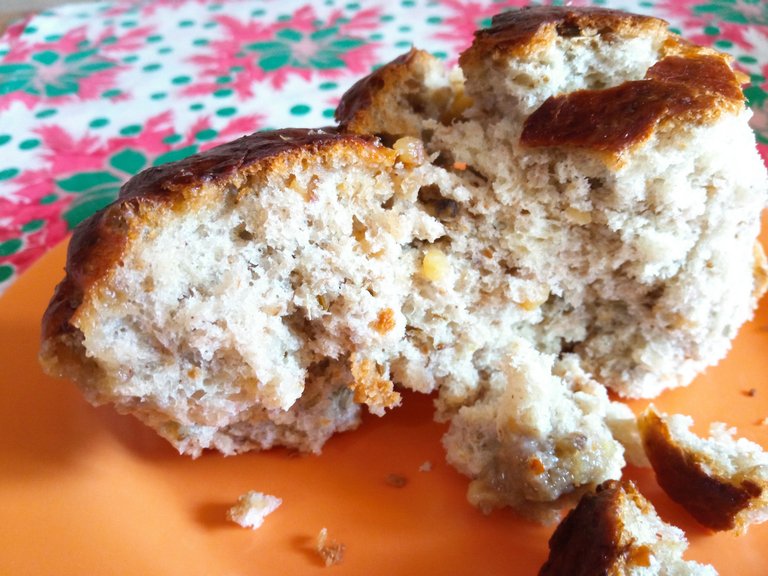
Esta mañana lo compartí con mi familia y lo aprobaron 😊, ¿qué les ha parecido esta receta? Espero sus comentarios, ¡que lo pasen bien!
This morning I shared it with my family and they approved it 😊, what did you think of this recipe? I look forward to your comments, have a good time!
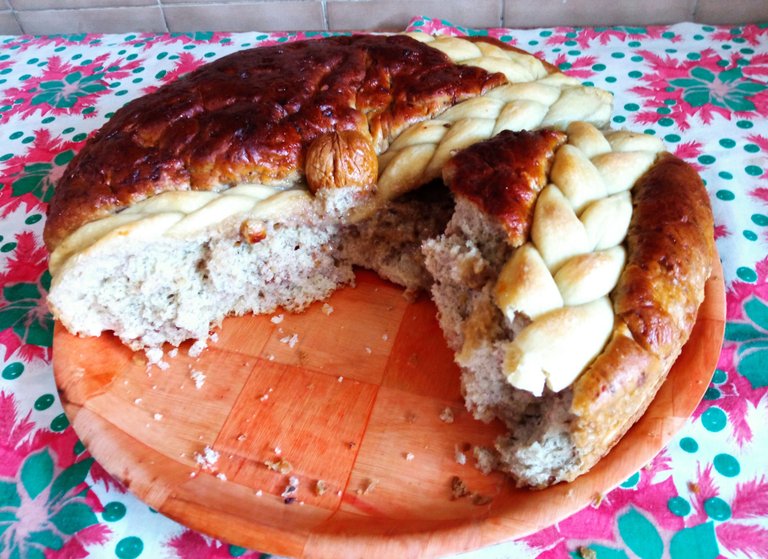
Todas las fotos son de mi propiedad / All photos are my property